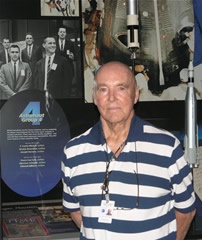NASA Scientist Astronauts
Duane Graveline MD - December 2008
With thorough and meticulous research, two experienced writers - Colin Burgess and David Shayler - have reproduced the events of the selection of NASA's Scientist-Astronauts into the Apollo program as if it were yesterday instead of 42 years ago.
Nearly 1600 men with differing scientific backgrounds applied. NASA culled this down to some 400 who were reviewed by the prestigious National Academy of Sciences. They in turn further reduced this number to 16 finalists who made their way to San Antonio, Texas at Brooks Air Force Base for an elaborate physical, emotional and intellectual evaluation.
Since I was already there in my capacity as Analyst of Foreign Bioastronautics, I had only to drive onto the base from my nearby home to meet with my companions. I could see some tough competition in this group but I never doubted for a minute that I would make it. My only question was who else?
Not only had I been doing space medicine research during the previous decade as research scientist in the Air Force, studying prolonged weightlessness but I also had been analyzing the Soviet space program with our Foreign Technology Division, studying cosmonaut Biodata and had been working with NASA from our very first shot of Shepard and even Enos, the chimp, in the capacity of medical monitor with duty stations all around the world.
 My research had laid the groundwork for astronaut zero-G countermeasures and, there at Brooks, I had just developed the lower body negative pressure device for zero-G orthostatic tolerance testing subsequently to be used in Skylab, Mir, Shuttle and Station astronauts.
My research had laid the groundwork for astronaut zero-G countermeasures and, there at Brooks, I had just developed the lower body negative pressure device for zero-G orthostatic tolerance testing subsequently to be used in Skylab, Mir, Shuttle and Station astronauts.
The first group of seven Mercury astronauts were my acquaintances and friends. In addition I had accumulated well over 4,000 hours of flying time as a USAF flight surgeon. I had no competition!
When finally we six were picked we knew from the very beginning who of us was going to the moon. We two doctors knew that we would not be going. There would not be much doctoring on the moon.
The emphasis was on geology and we had only one geologist in our group and he just happened to be hand picked by renowned planetary scientist, Eugene Shoemaker, the very guy who picked our group in the first place. There was not a shadow of a doubt of the final outcome and Harrison Schmitt, geologist and my roommate at Williams AFB, was the lucky guy on Apollo 17.
This was the time I received that blistering salvo from my wife's lawyer, "That's the way we do Texas divorces!" Several months later, when I got the message during our T-38 training at Williams that NASA Director Robert Gilruth wanted to see me I honestly thought he might want me for some special duty, possibly with the Soviets. It was only when we shook hands the next day in his NASA office that I knew I was out. In that one second of "pressing the flesh" the awful truth flashed through my mind. Words had not yet been spoken but they were not really necessary.
Back into the arms of my wife and children for over a year but I was deeply wounded. With every Apollo shot I sank more deeply into depression and despair. Three years later we divorced and the silent solitude of my cabin in the woods restored me.
It is all here in this wonderful book - the selection process and the subsequent roles of the scientist-astronauts in Apollo, Skylab and beyond. We had no idea then that the Apollo program would end prematurely and none of us had even heard of Skylab but we had made our choice and awaited the future, no longer in control of our destinies.
I was to return to NASA during the research and development phase of the shuttle program as Director of Medical Operations and still take my annual physicals at Johnson Space Center as one of the "old guys."
My special interest today is the galactic cosmic radiation problem of the future and several years ago I developed a project at Brookhaven National Laboratory, using NASA's linear accelerator there to study the effects of these "cosmic darts" on the brains of experimental animals. So I may have left the program long ago but somehow, almost uncontrollably, my mind still remains there in space.
Duane Graveline MD MPH
Former USAF Flight Surgeon
Former NASA Astronaut
Retired Family Doctor






